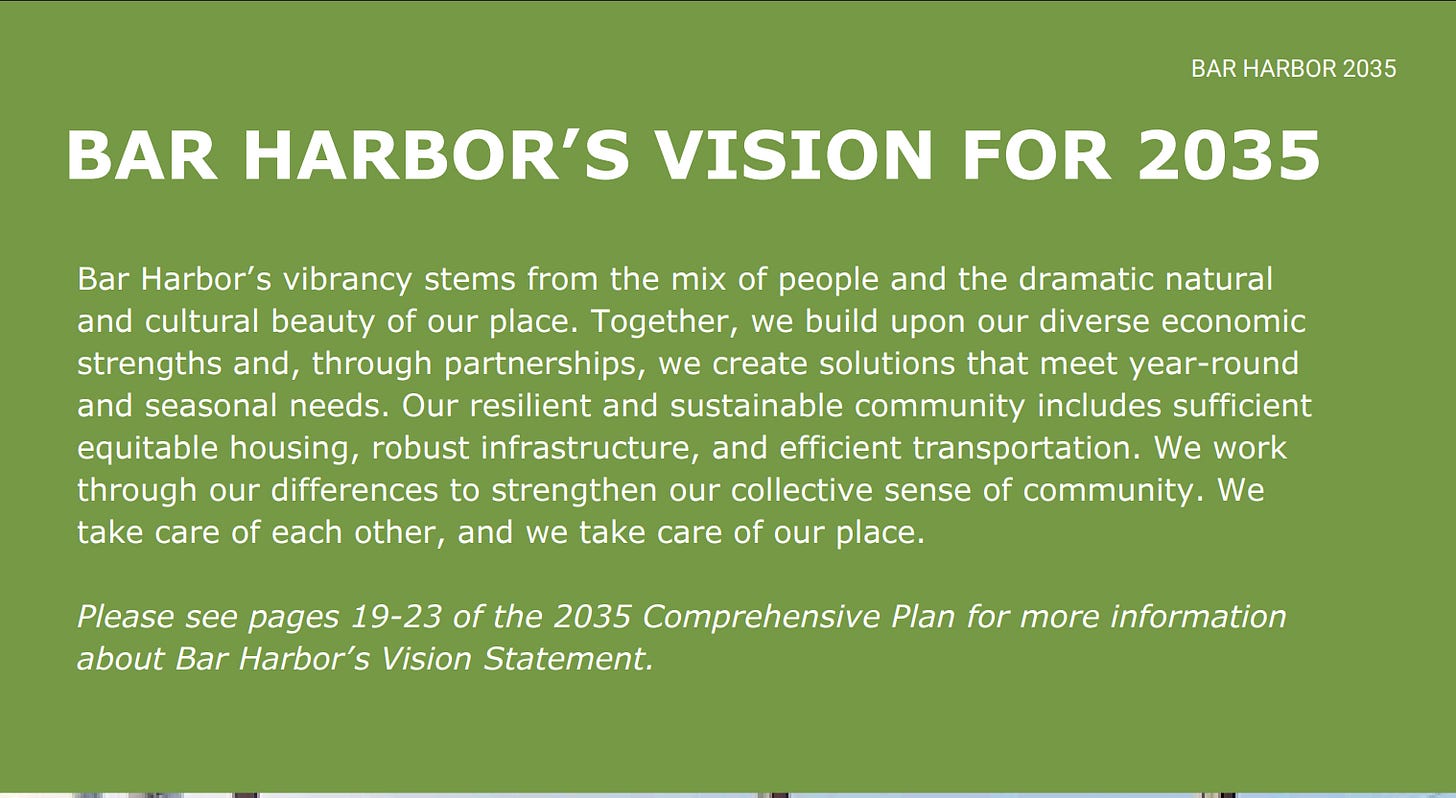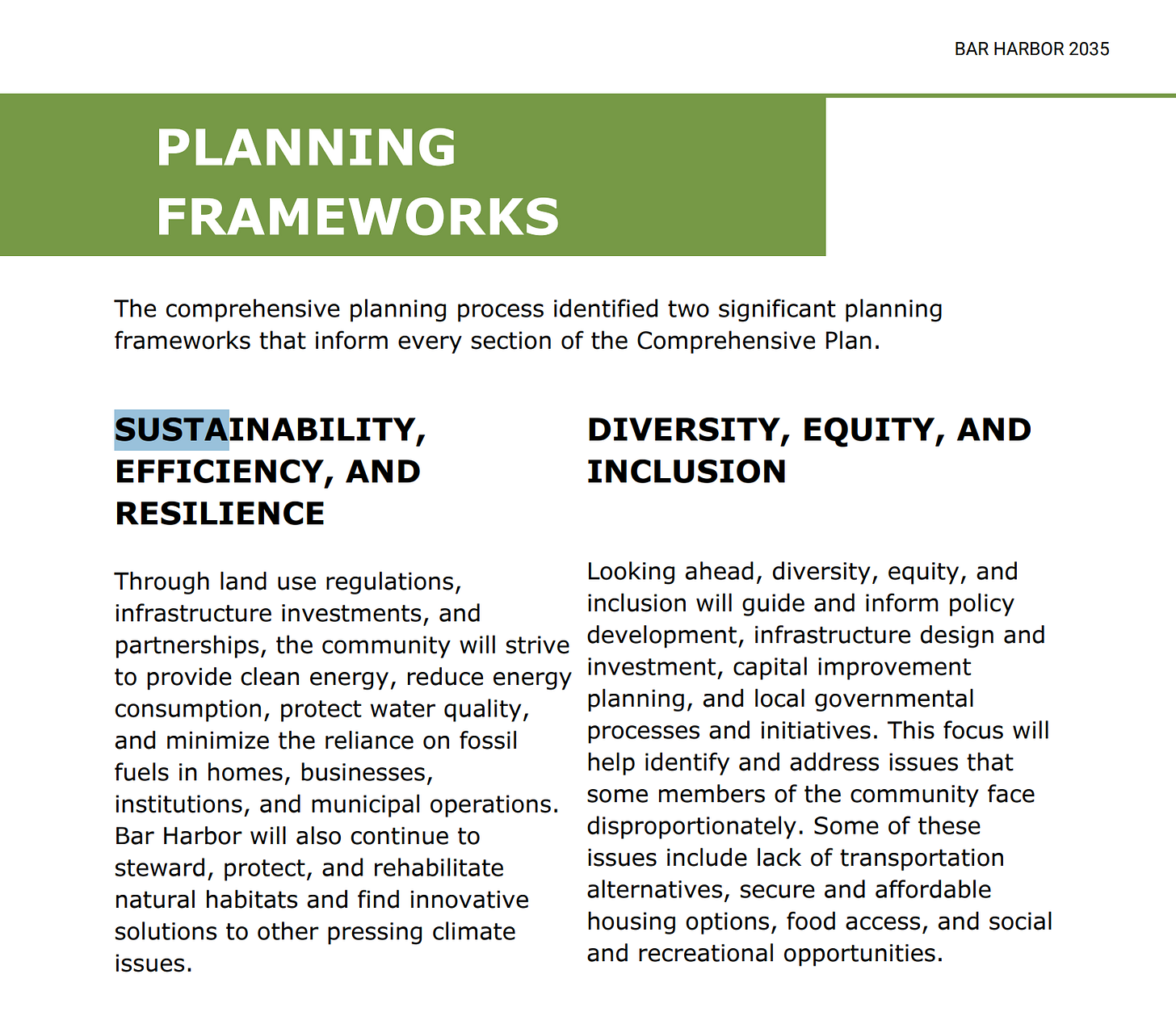Seeking Balance: Bar Harbor Task Force Begins to Tackle Sustainable Tourism
While asking, "What Is ‘Sustainable Tourism’?"
The Bar Harbor Story is generously sponsored by The 1932 Criterion Theatre.
BAR HARBOR—The first step of Bar Harbor’s Sustainable Tourism Task Force was to organize itself, and it did just that on July 10, electing Vicki Hall as chair and Enoch Albert as vice chair during its organizational meeting in Council Chambers in the town’s municipal building.
What sustainable tourism looks like for Bar Harbor, what Bar Harbor’s definition of sustainable tourism is, and how Bar Harbor can impact tourism when Acadia National Park draws more than four million recreational visits a year and the Maine DOT controls the road onto the island may be some of questions the town tries to answer.
One of the task force’s next steps will be to understand and define “sustainable tourism,” and what tools the task force can use to engage community. The group hopes to work with a hired consultant to help guide the process, engage the public, and define those terms for Bar Harbor.
“This is a very broad and diverse community and in order to touch each part of it, we have to use different tools,” Hall said about engaging the public.
The goal of the 13-member group is to have a clear vision for Bar Harbor’s tourism future, Bar Harbor Planning Director Michele Gagnon said. She expects that will take 12-18 months.
“It is about what’s best and wanted by the community as a whole,” she said.
The task force is to bring a report to the town council about sustainable tourism. What exactly will go in that report will be determined by the process. Its members were appointed by the Bar Harbor Town Council in April. The town council had approved the task force during its January 21 meeting.
On Thursday, Gagnon said that the task force’s work will be building off the Bar Harbor 2035 Comprehensive Plan, which was approved by voters this year.
“We don’t want to restart from zero,” Gagnon said.
Others agreed mentioning how the issue of tourism has created a divisiveness in the community.
“I want to encourage consensus because that’s really what’s going to get us something that’ll be useful, that’s actionable, that won’t just be a fight all the time, that has the potential to bring the community together if you can do that,” Town Council Chair Valerie Peacock said.
Councilor Steve Boucher and Warrant Committee member Carol Chappell also attended in person as members of the public. Two members of the public attended via Zoom. Those counts don’t include reporters.
In Bar Harbor, the town council has spoken about tourism in ways that have made papers since at least 2019 and sustainable tourism was discussed at the town council’s goal setting at the time. The town has changed the rules governing cruise ship disembarkation
In 2019, the Mount Desert Islander’s Becky Pritchard wrote, “The council voted unanimously to revise the strategy in question, 2d in the draft document, to read ‘work with stakeholders to ensure the maintenance of a sustainable tourism industry.’”
At a council meeting in February 2024, Councilor Joe Minutolo said, “I think there’s some real consensus on some of these topics that we have with this council. There are ways we can move the needle and we have to move the needle. It’s time.”
Peacock said Thursday that she knows it’s a big ask and she’s willing to help.
“I think consensus really does matter. A lot of the times we name the sides, but we haven’t done the conversation in the middle about how do we get through this together. This is the place that that could happen,” Peacock said.
According to the town’s website, “The Sustainable Tourism Management Task Force was established to evaluate tourism management challenges, develop proposed solutions, and provide findings and recommendations to the Town Council.”
“It’s a really important conversation,” Peacock said, thanking the members. She said the council was there for them as they do their work.
Multiple members also said that public input was important to them and encouraged its inclusion in the process.
Conversation also touched on definitions involved in their tasks.
“I’m struggling with just the name of the committee. What does ‘sustainable’ mean?” member John Kelly asked.
Albert had taken some definitions of ‘sustainable tourism’ off the internet and read one from the United Nations. He mentioned minimizing negative impacts, maximizing positive impacts, and having a long-term plan.
"The other principles that they mention are environmental, social, and economic sustainability,” Albert said. Those principles can guide toward a balanced and sustainable future. He also mentioned the Global Sustainable Tourism Council, which is online.
Albert read a simple definition of carrying capacity, explaining, “It’s the number of a species—in this case humans—all of us—that can be supported in a particular area indefinitely given that there is endowment of water food and other necessities.”
He suggested going after “low-hanging fruit” such as cell phone reception, which is typically less stable during the summer months. Kelly said the Bar Harbor Chamber of Commerce has been working on that problem with carriers for years.
Kelly said he was glad that the definition of ‘carrying capacity’ was brought up and the conversation was complex.
“This doesn’t apply to people because we have the ability to change all these things,” Kelly said. “The same principle applies but there is a social care capacity.”
Member Christopher Cannon mentioned seasonality and spoke to the complexities of solutions and ripple effects. “How do you define a good metric between sustainability and improving quality of life and a detriment to the environment.”
What time to meet, how often, whether to follow Robert’s Rules of Order (a system of running meetings), public comment periods . . . all of those things were discussed at the task force’s first meeting in council chambers, run by Gagnon and her Staff Planner Hailey Bondy.
Task force member Pat Buccello asked about how written comments from the public (submitted via letter or email) would be handled. Gagnon said she’d attach it to the group’s agenda and let the chair handle it.
“We don’t have consensus in what sustainable means,” Hall said and suggested they start with that at the next meeting. “That seems like a very good place to start just to define what we mean by the title.”
Jim Glavine said there was language in the comprehensive plan about that as well.
David Woodside said that looking at other area’s sustainable tourism plans would be helpful, not to necessarily emulate but to trigger ideas.
Gagnon said a tourism economy is one part of the town’s overall economy and there needs to be decision and discussion on that level.
In a 2022 press release, said Acadia National Park Superintendent Kevin Schneider, said. “People come to Acadia National Park to enjoy and learn about the park’s incredible landscape and history dating back to ancestral home of the Wabanaki people. We recognize that tourism to Acadia is a critical driver to the local economy, bringing nearly 6,700 jobs and $479 million in revenue to communities within 60 miles of the park.”
Carrying capacities, limits of change, there is always a mix of quantitative data involved when looking into these sort of issues, Gagnon said.
“The hard discussion that is happening right now is quality of life,” Gagnon said, pointing them to section six of the bylaws, which will be something the consultant will be helping with.
LINKS TO LEARN MORE
Taskforce Contact
You can email the taskforce: STMTaskForce@barharbormaine.gov.
The Planning Department staff are also included in the group email.
Sustainable Tourism Management Task Force bylaws
The task force’s page on the town’s website.
Comprehensive plan executive summary
Follow us on Facebook. And as a reminder, you can easily view all our past stories and press releases here.
If you’d like to donate to help support us, you can, but no pressure! Just click here (about how you can give) or here (a direct link), which is the same as the button below.
If you’d like to sponsor the Bar Harbor Story, you can! Learn more here.











One issue that chafes the community is dog poop. Bar Harbor constantly advertises as a dog friendly destination, yet while we provide dog poop bags we don’t provide a place to put poop. While it seems like an easy fix, it’s a more complicated issue. Dog poop is considered hazardous waste and the town is not equipped currently to handle it. It would be more expensive to remove, but if we derive increased income from the canine tourism market we should find a way to solve this issue.